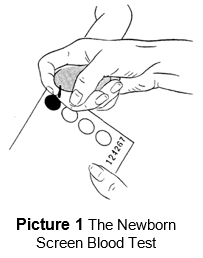Newborn Screen Blood Test

Ohio law requires that all newborn babies have their blood tested. Even if your baby looks healthy, the Newborn Screen Blood Test will show if they are born with or at risk to have a rare genetic, hormone-related or metabolic disorder. If these disorder(s) are not found early, a child can develop serious health problems or die. Most of these disorders are inherited (passed down) from parents. Other follow-up tests are often needed to confirm a diagnosis. Many times, the follow-up tests will show that the baby does not have the disorder.
Early diagnosis and treatment can help your baby grow and lead a healthy life.
It is important that the blood sample be collected 24 to 48 hours after birth and before the 5th day of life. The test will be done before your baby goes home.
- If your baby gets tested before 24 hours, the test will need to be done again within 5 days.
- For a premature or sick baby or a baby transferred from another hospital, the health care providers at Nationwide Children’s Hospital will make sure that the Newborn Screen Blood Test and follow-up tests are done.
How the Test is Done
- The health care provider will clean one of your baby’s
heels with an alcohol pad, dry it and then prick the skin with a lancet. - The heel will be squeezed so that blood drips inside the circles on the Newborn Screening Test card. All circles on the card need to be filled completely for the test to be accurate (Picture 1). Your baby’s heel may look bruised for a few days.
- The health care provider will send the screening card to the Ohio Department of Health Laboratory.
- You will not be notified of the results unless further testing is needed.
- Your baby’s primary health care provider will keep the test results in your child’s medical record.
Examples of Tests Screened For
Amino acid disorders – Amino acids are in foods. They are the building blocks of proteins. With these disorders, the body cannot metabolize (break down) amino acids into protein for energy. Soon after birth, they build up and can damage the brain and other organs. The Ohio newborn screen tests for 11 amino acid disorders.
Fatty acid disorders – With these disorders, the body cannot break down fat in food to turn it into energy. Babies with fatty acid disorders can have seizures, extreme weakness and heart and breathing problems. The Ohio newborn screen tests for 8 fatty acid disorders.
Organic acid disorders – These disorders are linked to a missing enzyme(s) in the body. Enzymes help break down food for energy and get rid of leftover waste. When waste builds up in the blood, it can lead to vomiting, low blood sugar, coma or death. The Ohio newborn screen tests for 12 organic acid disorders.
Biotinidase deficiency – With this disorder, babies cannot use the vitamin biotin, which is found in breast milk, formula and many foods. The body needs biotin for normal growth and development. Without it, a baby can have problems with skin rashes, seizures, weak muscles, hearing loss or mental retardation.
Congenital adrenal hyperplasia (CAH) – With CAH, the adrenal gland (near the kidneys) does not make specific hormones needed for growth. Babies can develop life-threatening episodes of vomiting, dehydration, and coma. Baby girls can have abnormal looking genitalia (private parts). The physical changes may be less obvious in males until they get older.
Primary congenital hypothyroidism – With this disorder, the thyroid gland (at the base of the neck) does not make enough thyroid hormone to keep the baby growing and developing. At birth, the baby can have weak muscles, problems feeding, swollen eyes or head, a large tongue, yellow skin (jaundice) and sleep a lot.
Cystic fibrosis (CF) – This disorder affects the lungs, digestive system and other parts of the body. Children with CF get lung infections easily and are not able to digest food properly.
Galactosemia – With this disorder, the body cannot break down the sugar in milk (galactose). A build-up of galactose can cause brain and liver damage.
Sickle cell disease and other hemoglobinopathies – These disorders affect red blood cells. The abnormal red blood cells get stuck in blood vessels and cause severe pain, frequent infections, other serious health problems or even death. Babies diagnosed with sickle cell disease will be referred to the Sickle Cell Treatment Center at Nationwide Children’s Hospital.
Severe combined immunodeficiency (SCID)– This includes a group of rare but serious disorders of the immune system. The immune system protects the body from infections. With SCID, the body cannot make the cells to fight off germs (viruses, bacteria, and fungi) that invade the body. Babies can get life-threatening infections easily.
Lysosomal storage disorders – With these disorders, the body does not make enzymes needed to metabolize (break down) sugar and fats into energy. Instead, the sugars and fats build up and damage the brain, heart, liver and other parts of the body. The Ohio newborn screen tests for 3 lysosomal storage disorders.
If you have any questions about the Newborn Screen Blood Test, be sure to ask your child’s health care provider.
For directions to the nearest Laboratory Service Center, please call Laboratory Services at (800) 934-6575 or visit www.NationwideChildrens.org/Lab.
HH-III-88 ©2000, Revised 2021, Nationwide Children’s Hospital
